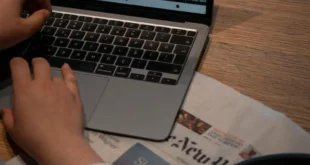Not yet a year old, Dubai Media City is drawing big names like MBC and Reuters—and broadcasters say they're happy with their new home.
The view from Dubai Media City is tremendous. Besides the massive and shiny new Dubai Media City and next-door Dubai Internet City facilities themselves, across the man-made lake lies the six-year-old American University of Dubai, and beyond that, the Hard Rock Cafe. On the other side is the gorgeous Mirage hotel built in traditional Arab style. It's hard to believe that only a few years ago, all this was desert.
Dubai Media City is part of the Dubai Technology, E-Commerce and Media Free Zone Authority, which also includes Dubai Internet City and Dubai Ideas Oasis. Offering 100 percent foreign ownership and tax exemptions both for companies and individuals, plus guarantees of an atmosphere in which media people can freely practice their craft, Dubai Media City has seen tremendous growth in the just over nine months since its launch. When TBS reported on Dubai Media City a year ago, the phase-one buildings were still under construction. In January 2001 Dubai's Crown Prince and the visionary behind the Media City project, Sheikh Mohammed bin Rashid Al Maktoum, officially launched DMC with not only guarantees of freedom of expression, but also hopes that DMC would be "the arena for free-thinking talent. We want this city to be a place where the media around the region and the globe will bring their productive and creative talent home. We want this city to help facilitate both the networking among regional Arab talent and the joining and integration of such talent with the rest of the media world."
Since then, DMC CEO Saeed Al-Muntafiq told TBS, they've been very pleased with their success. MBC, Reuters, Sony, Zen TV, Middle East Business News, and other major broadcasters—not to mention publishers, graphic artists, writers, and others—have moved in. CNN plans to set up a regional news bureau here and to launch their Arabic-language website, CNNArabic.com, which, in a nice example of the synergy between two neighboring projects, will be administered from Dubai Media City and hosted at Dubai Internet City. The list of residents and soon-to-be residents includes not only Middle Eastern broadcasters and international ones, but also, perhaps reflecting Dubai's geographic position and demographics, India channels like UNI TV and AsiaNet and the Iranian Soroush Multimedia.
"If we just look at the kind of companies that we've been able to attract over the last nine months of our existence in terms of broadcasting," says Al-Muntafiq, "I think this shows how much we've established ourselves as a regional hub. Our vision is not to be a regional base for broadcasters, but to be one of four or five global bases for broadcasting as we move forward over the next few years."
Phase one of Dubai Media City includes the three now-existing buildings, a total of 360 thousand square feet of leasable space. By January 20, the day of the launch, that space was sold out. DMC is now moving into phase two which, in addition to more space, will include uplink facilites—obviously essential for DMC's broadcast clients, current or potential, but so far limited to temporary facilities built to see MBC through its move into Dubai. New housing projects, from the luxury Emirates Hills villas to reasonably priced apartments, are cropping up around the city, and could be an additional draw for Dubai Media City clients and their staff.
Broadcasters who are moving their operations to Dubai Media City cite several major advantages, not least of which is cost. As MBC News Director Steve Clark told TBS, "It's very expensive to run a news operation based in London. We have been here now for ten years. At the end of the day we are an Arab company primarily from the Gulf, so perhaps it's apt that we are returning to the Gulf. We will be closer to our core audience and obviously it will be more economic to run operations from there than from here."
Another plus is the facilities themselves. Reuters, like MBC, is a major "anchor" client for Dubai Media City, and like MBC has a building named for them. "It's been a very good move for us," says bureau chief Rawhi Abeidoh. "I don't think we could have coped with the current crisis in our old offices; we were really cramped for space. It's allowed us to expand, and it's so spacious and beautiful. We found that many more features and analysis was being produced from here than in the past, because our people are happier, more inspired, and more productive."
And, Abeidoh adds, the DMC guarantee of freedom of expression is critical. "There has never been any attempt by Dubai authorities to intimidate us, like in other places in the region. They've committed themselves to freedom of expression. They're talking about responsible journalism, and as a professional news agency we don't have a problem with that."
The question of "responsible journalism" goes back to the yet-to-be-announced regulatory framework for Dubai Media City, which is expected to address questions of how to balance freedom of speech against political and cultural concerns and sensitivities. Al-Muntafiq says that the regulatory framework is very close to being finalized, after a long process of examining other practices around the world and putting together a plan that fits the environment. The plan includes a code of ethics to be signed by every broadcaster and to be enforced by the broadcasters themselves, and establishes a tribunal that will deal with any complaints that might be brought against Media City's clients. Dubai Media City itself has established four "no's": no pornography, no broadcasters owned by political parties, no preaching of religion other than Islam, and no defamatory content.
Other broadcasters cite the advantages not just of Dubai Media City but of Dubai itself. Zafar Siddiqi is CEO of Middle East Business News, which produces a half-hour weekly English-language business roundup of the Middle East for CNBC. "Dubai is becoming the focal point for most multinational companies operating out of this area, and that helps us to get more interviews," he says. "It's an ideal location. The human resources are here, which is key, and there's a great infrastructure in place."
Adds Abeidoh, "Dubai is the busiest airport in the Middle East; there are a dozen direct flights to London every day—for a news organization that's critical. That was a handicap in Cyprus, when we were based there-it was very difficult to move, for example, to Cairo because there were only three or four flights a week. Here, there are four or five a day."
Gathering not only broadcasters but also print journalists, writers, designers, publishers, and IT experts in one place has also fostered a sense of professional community, which is almost palpable in the offices and cafeterias around the facility. Nowhere is this more visible than in the Media Business Center, an area in which freelancers—who previously had no way to operate in the UAE, which required company sponsorship for journalists—can set up shop.
"Key components for broadcasters are cost and people," says Al-Muntafiq. "The use of freelancers all over the world reduces cost for broadcasters in terms of content creation. That industry in the UAE has been unavailable, so we were mandated to create an industry for freelancers. We launched 150 open units that we lease to individuals at a price of 19,000 dirhams a year, about $3,500. For that you get a trade license, resident visa, desk, phone, computer, and business services like a shared secretary. Within two months we sold out. We have producers, journalists, music artists, writers, from all over the Arab world and outside. We're now converting two floors—we underestimated the success of it."
There has been an unexpected benefit to the Business Center: it acts as an incubation for new ideas. Says Al-Muntafiq: "We've seen, for example, four freelancers sitting next to each other, one of them a music producer, another a TV producer, another a journalist, and another a presenter. They formed a company, and are moving in to the phase-two buildings of Dubai Media City. It's a community. This is the kind of networking that knowledge economies are all about."
Other DMC residents are finding similar benefits. "We're in an environment where a lot of our customers are, and potential customers," says Hassan Ghoul, general manager in Dubai of Sony Broadcast and Professional. "Right upstairs or right in the next building there's a potential customer. We're doing the move and the installations for MBC; we've had a team on-site for a month now. We're equipping their new studios here. One key thing about MBC is that they didn't want to go off air; they wanted to continue transmitting through their move. So while we're moving their equipment we're setting up intermediate facilities for them."
In mid-October Sheikh Mohammed officially announced DMC's cooperation with the American University in Dubai, the latest move in a general campaign to cultivate local talent and provide opportunities for students interested in media careers. Sheikh Zayed University, a school for women, has an office in Dubai Media City. DMC is weeks away from announcing the winners of its Ibda'a Awards—a competition for students from universities in the Middle East and India who are studying television, graphic design, film, writing, and other media—and is expected to soon launch Knowledge Village, a complex that includes the Dubai Media Academy and the Dubai IT Academy, in which experts in various fields will teach their specializations to students and recent graduates in what could be termed a formalized internship program.
Cooperation with local universities and training centers is of mutual benefit to students and Dubai Media City clients. Says Abeidoh of Reuters, "we've established a relationship with Sheikh Zayed University; I did a presentation about specialized journalism, about oil coverage and why it's important, why the Gulf is important. We've met with several of their people, had mass media students visit us here. In February we'll start taking students as interns, students recommended by their department as people who can understand our work and what it requires. Similar programs have worked very well for us elsewhere. In Cairo, for example, we had about twenty people in the program, and many of them stayed and are still working for us now."
The cultivation of young talent is clearly visible up on the fourth floor, in the spacious studio and office space of Zen TV. Zen, a joint venture between Dubai Media City and Lebanon's Future TV, is a channel targeting teens and young adults, and is the first to be broadcasting out of DMC, doing two hours a day of live talk shows using their own SNG—the only SNG currently in the facility, meaning they have made deals with other companies, such as Reuters, for use of the equipment.
In another example of the synergy at work in the DMC environs, Zen, says executive producer Bassam Halimeh, is preparing an Internet-oriented show with Dubai Internet City and working with students from AUD. Notably, the channel's Dubai presenters are mostly UAE-national students from local universities, including young women from Sheikh Zayed University. This is indicative not only of a push within Dubai Media City and Dubai itself toward training young new talent, but more generally, a city-wide climate that encourages young women to be a big part of Dubai's unique blend of cultural preservation and cutting-edge professional development. But then again, in a city where it is young traditionally dressed Emirati women who not only check you through passport control at the airport, but who are also waiting outside next to their taxicabs to drive you to your hotel, maybe this should come as no surprise.
 Arab Media & Society The Arab Media Hub
Arab Media & Society The Arab Media Hub




